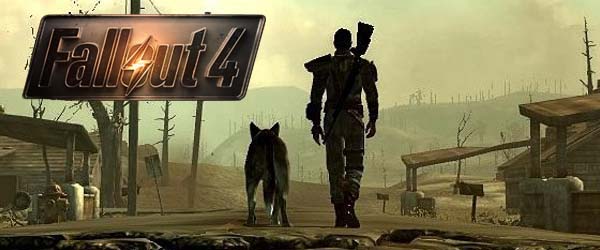
"Pirate Lord Captain Gregle, Slayer of Ancients and World-Renowned Trapeeze Artist" sounds like a pretty legendary character, right? Well, he wasn't. In fact, he was a very lucky, over-achieving halfling rogue in a short-lived campaign of Dungeons & Dragons. I rolled for the character's initial stats, got fairly low constitution, and then rolled the minimum value for hit dice for the first few levels. The result was a sixth-level character with a pathetic sixteen max hit points! A single lucky shot from virtually any enemy could be an instant KO for that character, and getting engaged in melee would practically be a death sentence. While some power gamers may scoff at the idea, rage against their dice, and then remake their character with a standard array and average HP, I decided to run with it and role play the hell out of little Gregle.
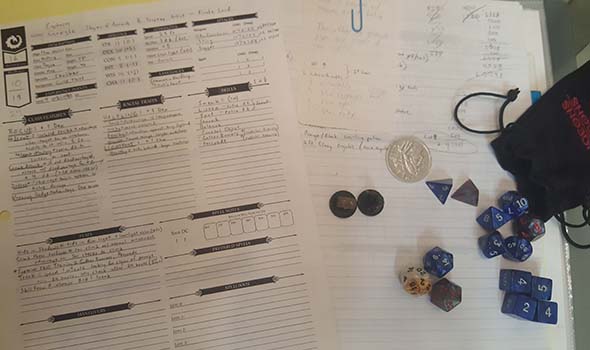
Character sheet for "Pirate Lord Captain Gregle, Slayer of Ancients and World-Renowned Trapeeze Artist"
With the low initial constitution, I focused my character around stealth abilities, disengagement and evasion tactics, and ranged attacks, and continued to improve those skills as I leveled. Knowing that he's a pathetic weakling, Gregle overcompensated by being a very flamboyant braggart and narcissist (I took inspiration from Stephen Colbert), and thought that he was more charming than he actually was. He routinely hid in the shadows, taking pot shots at vulnerable enemies and racking up kill steals from afar while his two warrior companions did most of the heavy-lifting. He would occasionally disarm a trap or unlock a door, and once used a clever trick to pacify (and subjugate) an entire band of pirates. He then took credit for much of the party's achievements.
Despite having only slightly above average charisma, he leaned on his halfling luck to succeed on some charisma checks and make himself a bit of a celebrity with the local townies for his exaggerated heroics. He reveled in the unprecedented access to their community that the locals provided, and he reveled in the adulant gifts that they showered upon him, happily hoarding it all in his bag of holding. The other party members never called him out on it in public, since they were just happy to have the cooperation of the locals.
While the other players and DM enjoyed Gregle's antics, their characters only barely tolerated his presence. During the actual adventuring, he was constantly getting into trouble and needing to be bailed out by his fellow adventurers. He once falsely awakened the party during his night watch after mistaking a wyvern for a dragon. In another instance, he was KO'd while using spider-boots to walk up a ceiling to pursue an enemy that had climbed a rope to escape the conflict, and he became stuck on the ceiling, forcing the party to figure out a way to get him down. They reluctantly obliged to help him, since Gregle was the possessor of the party's bag of holding, and was actually good at sneaking around to perform recon, unlocking doors, disarming traps, coming up with clever plans to avoid direct conflict, and other appropriately roguish things.
Gregle was one of the most fun characters that I've ever played, and he provided me with one of my most entertaining gaming experiences. This is the power of role playing to a character's strengths and weaknesses. It's a power that Bethesda shows no interest in utilizing for Fallout 4.
Out of the vault and into the wastes
I have to give credit to Bethesda for making one really interesting decision with Fallout 4: the game starts in a time period prior to the Great War that triggered the nuclear holocaust, and so it explores as yet unseen elements of the series' backstory. Or at least, it does for all of fifteen minutes. Much like Fallout 3, the pre-war gameplay and time that you spend in the vault is really just an extended tutorial and character-creation process. But unlike Fallout 3, it doesn't give enough time and depth to those settings to make the player legitimately care about them or the characters in them.
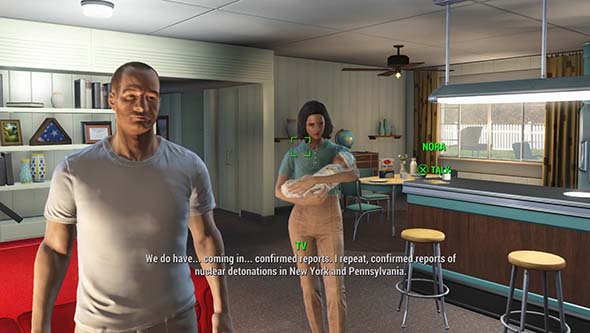
You don't spend enough time in your pre-war home or vault to develop any attachment to the place or people.
After creating your character and setting your S.P.E.C.I.A.L. stats, you and your spouse immediately flee with your infant child to the neighborhood vault. Once inside, you're handed the trademark silly superhero pajama jumpsuit and then promptly cryogenically frozen. You awake to witness your spouse get murdered and child kidnapped by apparent raiders, but then get frozen again. Then you awake again to do the combat tutorial against radroaches before leaving the vault and starting the game proper.
You spend virtually no time in the pre-war time period; you don't bond at all with your spouse or child; you don't establish any connections with your home or neighbors. There is absolutely no emotional bond between the player and what is lost in the war. So when the game drops you in the wasteland with a dead spouse, a missing child, and a quest to track down the kidnapper/killer, it does so without creating any emotional connection or investment for the player. I could go to Concord and then to Diamond City and search for my son, or I could just wander off in any random direction fighting raiders and painstakingly building my own little settlement out in the middle of nowhere using salvaged car tires and scrapped raider armor. Fallout 4 doesn't waste any time taking a nose-dive into the open world limbo.
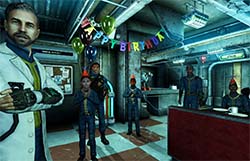
Fallout 3 simulated an entire childhood in the
vault, with friends, family, and even bullies.
Compare this against Fallout 3's prologue. It spent a considerably longer time developing your character and immersing you in the vault. Your dad (voiced by Liam Neeson) plays with you as a baby to teach movement and camera controls, he teaches you how to shoot, and throws a surprise birthday party for you. You interact with a childhood friend, other vault dwellers, and even a bully in order to tutorialize persuasion and speech checks and learn how to solve conflicts without violence. You even go to school and take a test to determine your default skills. In the short amount of time in the vault, you've lived a montage of an entire life.
With only a little bit of buy-in from the player, Fallout 3's Vault 101 becomes a living, breathing place populated with people who you can relate to and care about. You, as a player, have an investment in it and the characters that inhabit it. So when shit happens and you have to leave the vault, it's a monumental moment, and the events of your life, and the decisions that you've made, will shape your character's development over the rest of the game.
Even Skyrim gave the player interesting role-play decisions in its tutorial by required your character to make an immediate decision to follow the imperials or the Stormcloaks (though the scenario makes that decision a pretty one-sided one). And your initial choices of weapons and battle tactics would level up those specific skills; thus, starting the character down a path towards specializing in those skills as the game progressed (though you were completely free to change all that if you want).
And Fallout 4 has a perfect opportunity to take that father / son dynamic from Fallout 3, and invert it! The game could have opened with the birth of the baby. Since Bethesda had to record dialogue for multiple names for the player character, they could just as easily have done the same with the child's name. The doctor could hand you a paper with "This Year's Popular Baby Names", and you could chose one of those names that were explicitly recorded in dialogue. You could even be given the option to type your own name and replace the child's name with "my son" in dialogue. You could fill out the child's name and your own character's name on the birth certificate. Naming the baby would create a sense of ownership and connection to the child that might help encourage the player to pursue the main quest.

Fallout 4's vault serves only as a combat tutorial with no depth, emotional resonance, or meaningful decisions.
But it doesn't have to stop there... [More]
0b31d11f-77e0-4ddd-b277-8b1e013b818d|0|.0
Tags:Fallout, Fallout 4, Bethesda, RPG, Boston, commonwealth, minuteman, minutemen, wasteland, post-apocalypse, nuclear weapon, nuclear war, NPC, Dogmeat, power armor, crafting, ludonarrative dissonance, open world, sandbox, raider, synth, android, slavery, underground railroad, freedom, rights, morality, ethics, family
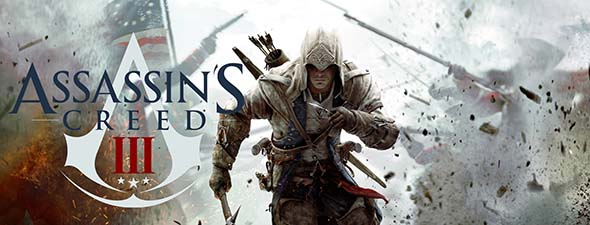
I never really hopped onto the Assassin's Creed bandwagon when the first one was released in 2007. The historical setting and gameplay concepts were intriguing and I wanted to play it, but I wasn't sure if I would like it enough to warrant an outright purchase. And since Ubisoft never bothered to release a playable demo on the PlayStation Network, I never played the game.
So I missed the first two games and their various spin-offs. But when I started seeing information about the third game, and its setting during the American Revolution, my curiosity piqued. The trailers made it look as though parts of the game were played during large-scale battles, and I thought that would be really cool to play. So when I found that a friend (Huh?Mr.Box!) was willing to let me borrow his copy, I decided to give it a chance.
And boy was I disappointed!
My core complaint with Assassin's Creed (and many other games like it) is that I don't like how dumbed down the controls are, and how little actual control the user has. The run button is also the "climb" button and sometimes the "jump" button (even though there is a dedicated "jump" button). I've always held that when a single button does everything, then it really does nothing. Assassin's Creed regularly feels like I am not playing the game; a procedural function created by the developers is playing the game.
Instead of the game just doing what the player tells it to do, it has to determine which of several pre-determined context-sensitive actions the developers decided to pre-program. You might want to try to sprint through a narrow alleyway between two close buildings to chase a courrier, but if you're just a few pixels off, you end up jumping up the side of the wall and climbing to the top of the building. And then it's a pain in the ass to get back down, and the courrier is now two blocks away.
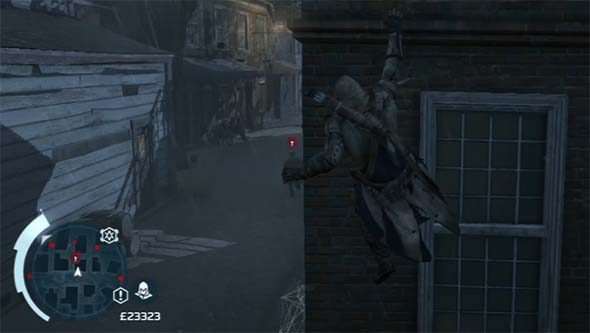
Because I wasn't lined up perfectly, the free run forces me to climb up this building,
when all I really wanted to do was chase the courier through this alley way.
Maybe I want to jump off of a building onto a nearby tree branch in order to stay above a group of enemy Redcoats that I'm trying to stealth past. But for some reason, the game decides to make my character leap past the tree branch and right into the middle of the group of bad guys. Now my cover is blown, I'm stuck in combat, and maybe I've even failed a bonus objective or two.
These sorts of problems could be avoided if the "climb" and "jump" commands were their own buttons separate from the "run" button... [More]
ae52b9af-d384-46f5-b50f-c751d6ac7cf6|1|5.0
Tags:Assassin's Creed, Assassin's Creed III, Ubisoft, historical fiction, history, assassin, parkour, colonial America, American Revolution, United States, minuteman, minutemen, Britain, Boston, sailing, Achievement unlocked, John de Lancie
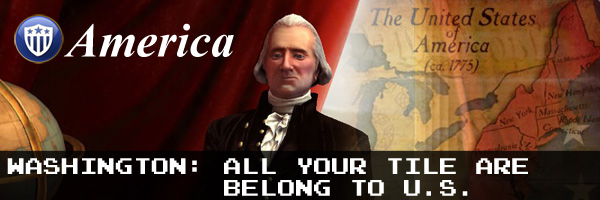
Continuing my series of strategy posts about Brave New World's modified civilizations, I'm going to take a look at strategies for George Washington's America. Since Brave New World's Fall patch (2013) America's ability was buffed and its unique unit now allows it to generate more late-game golden ages.
The lands of North America have been occupied by various native tribes for thousands of years, but these tribes lived in relative isolation from the rest of the world, except (possibly) for a brief period of interaction with the Danish Vikings. After Christopher Columbus landed in Haiti in the late 15th century, a flurry of explorers and colonists primarily from Britain, France, Spain, and the Netherlands began arriving in North America, rapidly exploring and settling the continent. These colonists gradually displaced the native inhabitants, including the Iroquois and the Shoshone. But conflict between the colonies and their European masters (primarily Britain) eventually culminated in a revolutionary war in which the colonists retreated to the countryside, and used guerrilla tactics to defeat the British and establish the United States of America.
Despite being founded on the principles of "equality" and "inalienable rights", the early history of the United States is dominated by tension between its slave-holding and free populations. These tensions eventually culminated in the outbreak of the American Civil War, which resulted in more American casualties than the Revolutionary War, both World Wars, and the Vietnam War. Combined. Union victory established America as a modern industrial nation with a singular identity, and Americans stopped referring to the country as "These United States", and began calling it "The United States". This war is also significant in world history because it is the first major war in which industrial technologies such as the machine gun, telegraph, railroad, steam-powered ironclad ships, and (probably most significantly) photography were used to large effect, which changed the way that future wars would be fought and the way that they would be perceived by the public. And it was one of the first major wars to employ new urban fighting tactics that would become the basis of combat for the wars of the 20th century. America would play a pivotal role in those 20th century wars as well, and would emerge from them as a dominant global super power.

George Washington was a colonial general who lead the British colonies in America in wars against the French and various Native American tribes. When the colonies declared independence, Washington became one of the premiere generals for the new colonial militia. Knowing that they could not defeat the British in conflict in the cities or open field, Washington and the other colonial leaders gave the cities to the British and retreated to the hills and forests of the countryside. Here, they successfully employed large-scale guerrilla tactics that weakened the British supply lines and culminated in American victory. Washington would then become the country's first President and set several precedents, such as the idea that the President would be a civilian position (as he refused to wear his military uniform while in office), and that the President should step down after two terms. [More]
9d9b8548-3186-4f3c-b9db-4a3a10293e70|1|5.0
Tags:Sid Meier's Civilization, Civilization V: Brave New World, Civilization V, America, George Washington, Washington, B-17, flying fortress, Manifest Destiny, line of sight, exploration, reconnaissance, ancient ruins, golden age, Golden Age from Victories, tile acquisition, musketman, bomber, Civ V Fall Patch, Minuteman, Civ-V, slavery, Atlantic slave trade

With Civilization V apparently at the end of its life cycle and unlikely to receive any more major updates or expansions, it's time to start looking to the future of the franchise: Civilization VI. Civ V was successful enough to spawn several spin-offs: Beyond Earth, Civilization Revolution 2 on mobile devices, Civilization World, and even a Civilization MMO. So it's reasonable to assume that if work hasn't already started on Civlization VI, then it will begin soon.
One of the things that I most love about Civ V is that each civ has unique powers that give them their own playstyles and flavors. The expansions (especially Brave New World) showed a lot of creativity with some of the civilizations. I hope that these design philosophies continue, and that we'll see some even more interesting gameplay variations in the new civilizations of Civilization VI.
To that end, I have a few ideas and suggestions for designs and themes for some of the common civilizations that are likely to appear in Civilization VI. I'll provide at least a unique abilility and at least two unique units / buildings / improvements, but I may also provide additional or alternative unique suggestions in case Firaxis decides to include even more variety and specialization. Since Civ VI will likely be a whole new game on a whole new engine, I can't give specific examples of the mechanics of these ideas. Instead, I'll try to focus on more broad concepts and maybe include examples based on Civ V's mechanics and features if relevant.
* NOTE: this post is a work-in-progress, and will probably be revised as I come up with additional ideas or clarifications. [More]
38b32f22-6121-4eec-82dd-ddc90cb4ce5d|0|.0
Tags:Sid Meier's Civilization, civilization, ability, unique, America, minuteman, Egypt, Nile, war chariot, Greece, city state, philosophy, hoplite, Huns, Mongols, nomad, Japan, Bushido, samurai, katana, dojo, ninja, Rome, road, legion, forum, Byzantium, cataphract, musketeer, immortal, MiG fighter, spitfire, Civilization III, Civilization IV, Civilization V, Civilization VI
|

| 12 | | | | | | | 60 | | 11 | | | | | | | 55 | | 10 | | | | | | | 50 | | 09 | | | | | | | 45 | | 08 | | | | | | | 40 | | 07 | | | | | | | 35 | | 06 | | | | | | | 30 | | 05 | | | | | | | 25 | | 04 | | | | | | | 20 | | 03 | | | | | | | 15 | | 02 | | | | | | | 10 | | 01 | | | | | | | 05 |
|